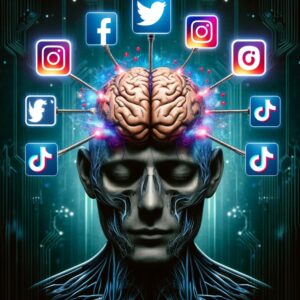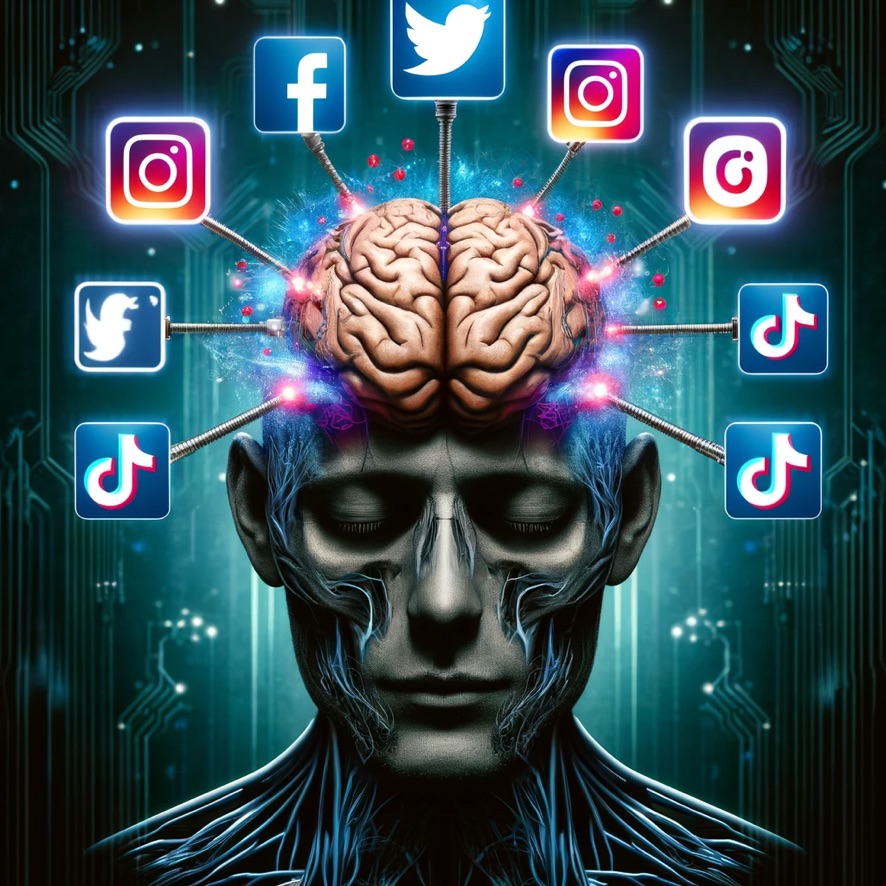How Social Media Is Hacking the Human Brain: A Deep Dive
 Problem Statement : Social Media’s Invisible Grip on Our Minds
Problem Statement : Social Media’s Invisible Grip on Our Minds
Social media has transformed the way humans communicate, consume information, and spend time. But beneath its convenience lies a powerful psychological influence that can shape behaviour, emotions, and even thought patterns.
Consider this: The average person spends 2 hours and 31 minutes daily on social media (DataReportal, 2023). That’s nearly one month per year, dedicated solely to scrolling through content. While it seems harmless at first, these platforms are designed to manipulate how the human brain works—altering our attention spans, emotional stability, and decision-making processes.
The Real Problem: Manipulation by Design
Social media platforms like Instagram, TikTok, and Facebook aren’t just entertainment services; they are profit-driven businesses. Their currency? Your attention. Every second you spend online generates advertising revenue for these platforms. To keep you engaged, tech companies employ psychological techniques rooted in neuroscience.
Key Facts:
• Dopamine Hits: Social media triggers the brain’s reward center, releasing dopamine—the same chemical linked to pleasure from activities like eating or exercising. Every like, share, or comment becomes a small hit of validation.
• Variable Rewards: Platforms use unpredictable rewards (similar to slot machines) to keep users scrolling. The uncertainty of “Will this next post be exciting?” keeps us hooked.
• Social Comparison: Seeing idealized versions of others’ lives can cause feelings of inadequacy, leading to increased rates of depression and anxiety (APA, 2022).
Agitation – The Consequences of Being Hacked
Understanding that social media manipulates our brains isn’t enough. The real challenge lies in how it affects key areas of life, including mental health, productivity, and even relationships.
1. Mental Health Decline
Social media’s impact on mental health is profound and well-documented:
• A 2023 study published in JAMA Psychiatry found that adolescents who spend over three hours daily on social media have a 30% higher risk of developing depression and anxiety.
• The constant stream of curated content creates a fear of missing out (FOMO) and can foster low self-esteem due to social comparison.
Case Study:
In 2022, researchers from the University of Pennsylvania conducted an experiment where participants limited social media use to 30 minutes daily. After four weeks, they reported reduced depression and anxiety levels and felt more present in real-life social interactions.
2. Reduced Attention Span
The average human attention span has dropped from 12 seconds in 2000 to 8 seconds in 2023 (Microsoft Research). This decline is largely attributed to endless scrolling on platforms like TikTok and Instagram Reels, which offer short, dopamine-triggering videos.
Why This Happens:
• Continuous Stimulation: Social media provides constant novelty. The brain adapts by demanding more stimulation, reducing its ability to focus on long-form content like books or articles.
Example:
A 2023 survey by Global Digital Trends found that 67% of Gen Z users struggle to concentrate on tasks for more than 15 minutes due to frequent smartphone use.
3. Relationship Strain
Social media also distorts relationships:
• Reduced Intimacy: Instead of real conversations, people are increasingly communicating through texts, emojis, and video snippets.
• Jealousy & Mistrust: Seeing a partner engage with others online can trigger insecurity and jealousy.
Research Insight:
A 2022 study published in CyberPsychology & Behavior found that couples who regularly check each other’s online activity are 40% more likely to experience trust issues than those who don’t.
4. Political and Social Manipulation
Social media isn’t just about entertainment; it’s a powerful tool for shaping public opinion. Algorithms push sensational content to increase engagement, creating echo chambers where users are exposed only to ideas they already agree with.
Real-World Example:
During the 2020 U.S. election, Facebook and Twitter’s algorithms amplified political misinformation, influencing millions of voters. A study by MIT Technology Review found that false news spreads six times faster than factual news due to the emotional reactions it provokes.
Solution – Taking Back Control
Despite its risks, quitting social media entirely isn’t realistic for most people. However, it is possible to use it mindfully and reduce its grip on your brain. Here’s how:
1. Practice Digital Detox
• Limit Screen Time: Set daily limits for social media use (e.g., 1 hour).
• Schedule Breaks: Try a social media-free weekend or vacation.
• Use Tools: Use apps like Freedom or RescueTime to block distracting sites.
2. Curate Your Feed
• Unfollow Negativity: Unfollow accounts that trigger negative emotions or promote unrealistic lifestyles.
• Follow Intentionally: Choose educational, motivational, or skill-building content.
3. Disable Notifications
• Turn off non-essential notifications to reduce dopamine-driven urges to check your phone.
• Set “focus” or “do not disturb” modes during work or family time.
4. Practice Mindfulness & Real-World Connections
• Be Present: Spend quality time with loved ones without phones.
• Mindful Scrolling: Set specific times for checking social media, rather than mindlessly opening apps throughout the day.
5. Educate Yourself
Knowledge is power. Understanding how social media platforms manipulate the brain can help you resist addictive features. Watch documentaries like The Social Dilemma or read books like Digital Minimalism by Cal Newport.
Final Thoughts
Social media isn’t inherently bad—but its design is based on manipulating human psychology for profit. The more aware you become of how your brain reacts to notifications, likes, and endless scrolling, the better equipped you are to reclaim your time and mental health.
Key Takeaway: You don’t have to quit social media entirely—but you must control it before it controls you. Start by limiting usage, curating your feed, and prioritizing real-world connections. By making these small changes, you can escape the mental trap social media sets—and use it as a tool rather than letting it use you.
Sources: APA (2022), Microsoft Research (2023), DataReportal (2023), MIT Technology Review (2020), JAMA Psychiatry (2023).







